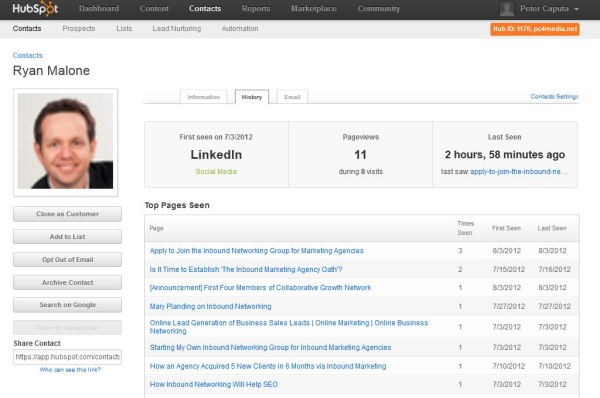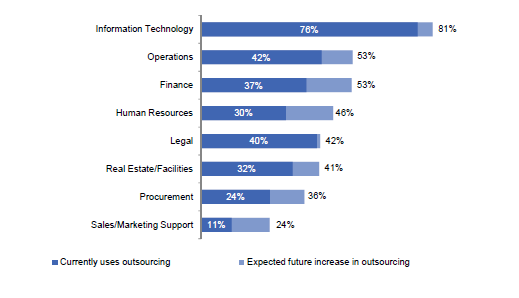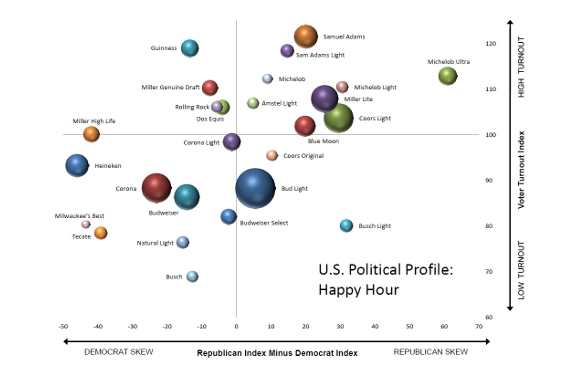There's too much Competition.
I know that "the web design business is dead" is a pretty dramatic statement. For the record, I don't think it's dead. I think it's going through a major transformation that most web design companies won't survive.
I did a search a little while ago on a yellow pages site and there are 28,402 companies categorized under "web site design" and 41,498 companies categorized under "web sites". This, of course, doesn't include the many small 1-5 person web design businesses who are too cheap to list themselves in the directory or smart enough not to waste their money on it. Then, there are the marketing and ad agencies that have gotten into website design, but still call themselves agencies.
There's a ridiculous amount of companies doing website design. Further, if the number of web designers that download HubSpot's free internet marketing resources are any indication, there are probably 100s of thousands of people or companies that call themselves web designers in the US. A full 15% of our leads are some kind of web or marketing agency.
The industry is completely saturated.
Most of them won't admit it in public (many have admitted it to me in private), but websites that used to get built for $100k are going for $50k, $50k for $25k and the standard $5k small business website is now getting built for $2,500 by someone's nephew, someone in India or a low cost high volume web site shop. And many are not that much different. The high cost providers are not always the high quality providers anymore. There's too much competition.
Website Design, alone, does NOT Provide an ROI.
The only thing that differentiates the average web designer right now is their design skills, which is highly subjective. And it's hard to correlate the effect of good design to the bottomline.
Unfortunately, graphic designers are a dime a dozen and attractive web design doesn't necessarily translate to online lead generation success and ultimately: dollars. Does a $10k graphical website design generate more leads than a $5k one? Not usually.
Hosting isn't a Business Web Designers Should Rely On.
Many web designers, historically, also provide hosting. Some of them manage their own servers. Many of them just have a reseller plan with a big hosting company. This provided a nice recurring revenue stream for web designers for a little while. More importantly, it set them up to charge their clients for site edits when new content needed to be published or existing content needed to be revised. However, any web designer that is relying on web hosting to generate revenue is fighting a losing battle. In fact, I think it's already lost. They're more like Saddam Hussein hiding in a hole resisting the inevitable. Website hosting is a commodity business if there ever was one. And low cost virtual assistants can edit websites now that most people have basic html skills. Long gone are the days when someone should be paying $50/hour to add a new press release to a website.
Web Content Management Systems Will Not Save the Web Design Business
Most web design companies have had to get a lot smarter about how they build websites too. There are still way too many web designers that build websites from the ground up, instead of on a content management system (CMS). (They're also still the ones still charging clients for hosting and site edits, who are afraid to give up that revenue stream.)
But, the good ones use a CMS.
However, even CMS implementation is not a strong differentiation source anymore. When a web design company is proficient with a more advanced CMS like Joomla, Ektron, Sitecore or Drupal, they're able to command higher dollars.
But, open source software like wordpress has made launching a website on a CMS easier, faster and much cheaper to launch for most small and mid-sized businesses. There's no software to buy and there's plenty of really smart low cost hep who are geniuses at configuring and customizing a design on top of the open source CMSs.
Just like design, CMS implementation skills alone are NOT a really big differentiator anymore either.
But, the biggest problem with web designers, is that they are busy building websites instead of delivering ROI to their clients.
Most web developers, once a site is launched, are done. They made their $5k, $50k or $100k. They need to get their next job started to make payroll. The average web site designer knows how to lay out graphics, write html and has someone on their team who can hack php and install server side software like the CMSs listed above. That's it. These companies rarely have internet marketing skills and experience. Or they say they do, but they're learning on their client's dimes.
Even worse, by putting the cart before the horse and building websites before an internet marketing strategy is established, they are making mistakes that they are going to have to charge their clients to fix.
"But, I'm a web designer and I'm learning internet marketing as fast as I can get clients to pay for it." Sorry! That's not fast enough.
Have you read the Innovator's Dilemma? How about the Innovator's Solution? If you haven't and you're in the web design business, and want to stay in business in the next few years, I recommend you go to amazon right now and order both.
The premise of the books is that to really win in business, you must destroy a convention. If you are already winning in business, you might have to destroy your own conventions.
As you can imagine, that's really hard. And doing it seems really stupid, I am sure, when people embark on it. But, history demonstrates that the ones who do it, succeed amazingly. For example, the NYT is now one of the top news destinations on the web because so many people link to them as stories break, which drives a lot of direct traffic and helps them increase search engine traffic. Do you remember when you had to pay to access their site? They walked away even though it was a $10M business. The most successful companies in the world followed the same disruptive technology path, atleast when they started. The Innovator's Solution is why Microsoft beat IBM with an easier to use OS; why DELL revolutionized the PC business; why Google beat Yahoo and Microsoft on the web with a more targeted advertising system selling clicks at a time for pennies each; why Salesforce.com is growing faster than SAP.
How many guys do you know that used to build and sell PCs? How many of them are Dell resellers now? Who do you think is doing better... Salesforce.com implementation consultants or ACT! consultants? How many web design companies built their own email marketing system, only to shut it down and transition their clients to Constant Contact, AWeber or Exact Target two years later?
Web designers are now competing against software as a service. All websites are is software. There's something about Software as a Service that is hard to compete against.
Most web designers and developers are designers first. Some are great software configurators. But, very few are great software developers.
Just like agencies tried to build their own email tools, only to move to reselling SaaS solutions, agencies will need to choose a marketing platform. There is no open source alternative, nor can there be given the complexity and integration requirements for modern marketing.
They can't provide powerful SEO tools, analytics, lead capture, lead intelligence, blogging, marketing automation, marketing contact databases and social media publishing tools that are integrated with each other, that companies like HubSpot provides. Not to mention all of the 3rd-party marketing apps that instantly integrate with the software like HubSpot for call tracking, chat and content sourcing, to name a few.
Previously, most small businesses would have to pay $500-$10k up front for just a website on a cms. Now, small businesses pay that for a full inbound marketing system with ongoing support and training. Larger companies who usually pay a $50k to get a custom web site developed are shifting those dollars to more sophisticated marketing software too, like HubSpot professional and HubSpot Enterprise.
Sorry to rain on web designers parade. That's not HubSpot's intention. Remember that thing about destroying conventions? Business is about creative destruction. It certainly doesn't make sense to have 100,000 people manufacturing cars in their garages. Websites aren't as complex as cars. But, the brains behind business websites are getting much more complex. Should we really have 100,000 people in small offices around the country creating websites?
Software as a service and streamlined processes enable HubSpot and our partners to provide a full inbound marketing platform to businesses at a lower cost than website and CMS development alone.
Websites are no longer brochures. Websites are platforms that are increasingly connected to the distributed computing power, structured information and rapidly expanding social networking community of the web. Standards will arise. Platforms will win.
Just like Amazon and eBay won in ecommerce. Like Zoho and Salesforce are winning in project management, crm and other business productivity solutions. Just like Google has won in search and ad targeting and delivery. There will be web marketing platforms that provide an ROI to small businesses who want to do measurable marketing. These platforms will provide more value for a lower investment than Bob & JoJo's web design business in Albequerque, NM ever could or will be able to do.
It's not all doomsday, though. The platform needs operators. Business is still about relationships. People will still want to work with people - face to face. HubSpot will never have a maningful physical presence in New Mexico. Social media, SEO, blogging, PPC, content creation... none of these things are easy to fake. It takes skill, creativity and refined proven processes to implement an internet marketing strategy that supports a business's growth strategy. There are very few people that are excellent at these things.
And that's the opportunity. I think very few web designers will make this transition. The ones that do will be rewarded. The agencies who already made the decision are growing rapidly. But, I think in the next few years we'll see a massive shakeout...
The web design companies that transition themselves to online marketing services companies will win. The ones that still exclusively generate revenue $5k or $50k at a time by building websites from scratch won't. Web design companies must transition to charging retainers based on a demonstrable ROI for their clients.
Here's the rub. As web designers transition, so do PR agencies, marketing agencies, ad agencies, copywriters, seo consultants etc. Anyone who wants to be relevant needs to transition, or atleast broaden, their offering to include ongoing internet marketing services.
Paul Roetzer declared the Dawn of the Inbound Marketing Agency a few years ago. Today, inbound marketing agencies are thriving. At HubSpot, we're working with hundreds of agencies who have transitioned to providing inbound marketing retainers. They're doing very well. Meanwhile, most web design firms are die-ing.
Do you run a web design or creative firm? How are you transitioning? Or are you still in denial?







